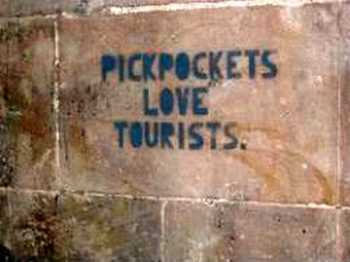3 Travel Scams To Avoid While Traveling Abroad
“We are offering you a 3 night and 4 day holiday package in Switzerland selected through a lucky draw.”
“You are selected for a free credit card designed especially for shopping anywhere in our country.”
“Sir, may I take your credit card information for security reasons in our hotel.”
 It is not hard to comprehend what these lines signify. These are some of the very popular baits and travel scams used to trap foreign tourists in almost every part of the world. You must keep one point very clear in the mind while travelling abroad that what sounds reasonable works perfectly well as bait too.
It is not hard to comprehend what these lines signify. These are some of the very popular baits and travel scams used to trap foreign tourists in almost every part of the world. You must keep one point very clear in the mind while travelling abroad that what sounds reasonable works perfectly well as bait too.
The scam list is endless. You may not be able to contemplate that what is good or bad given the mind-boggling circumstances in a foreign land. The main reasons that account for these scams are language constraints, cultural differences, unfamiliar territory, and different currencies.
However, well informed tourists rarely fall in the trap of these kinds of scammers. The prerequisite to avoiding these frauds is to extract as much information as possible. Another intelligent tactic is to read about the culture and history of a particular country that you intend to visit.
To help you out with the most common scams, below is a detailed list with solutions on how to avoid them:
1.) Credit Card Scam During Stay at a Hotel
The most common travel scam that foreign tourists face is receiving a call in the middle of their sleep, late at night, from the hotel’s reception desk demanding credit card information due to faulty registration. The alarm bell in the mind should ring as soon as this kind of call is received by a tourist. First, hotels never bother their esteemed guests in the middle of the night unless it is in a case of an emergency or some mishap. Second, they discuss such matters personally with the guest even if the situation is critical. The best ways to avoid this common fraud is given below:
- Never make a hotel reservation with tourist agents stationed outside airports or railway stations offering unsolicited help.
- Always book a hotel by directly contacting the concerned authority or through a reputable travel agency.
- Don’t give out any credit card or personal information in case you receive such calls. Hang up by saying that you will contact the reception desk in the morning regarding this issue.
- Last but not the least; report the issue to the concerned management and demand action regarding the same.
2.) Flat Tire Fraud and Robbery
There will be instances when a local driver informs you about a flat-tire and asks you to pull over for a replacement. This scam has two versions. First, the tire is actually punctured. Second, the tire is not at all punctured. In the first case, you must remember that the person offering help could have himself created the situation to cause the problem.
And in the second case, you must have encountered a scammer who is trying to bluff by lying about a particular situation. You should keep the following points in mind to avoid such scams:
- Never accept unsolicited help from a fellow motorist. Keep a list of the phone numbers of legitimate authorities handy to call them in case of an emergency. In most of the countries, it is advised that you should only ask the local police for roadside help.
- Inspect your car or motorbike for any possible mischief before leaving the hotel.
- In case you are trapped in the middle of the road with a scammer holding a gun or a knife, don’t try to resist them. Stolen stuff can be recovered by lodging a complaint afterwards.
- Always grab an authorized and licensed taxi from a recommended taxi stand outside your hotel. Check the number plate for identification of a legitimate taxi driver according to the local laws and regulations.
3.) Fake Police or Police Uniform Con
The most intimidating experience in one’s life comes when one is approached by a police officer in a foreign country. Police officers are hard to avoid. Therefore, you must stay attentive at all times whether these people in the uniform are real or fake. They approach mostly in a group of two and ask the tourist to handover the credit card and PIN number for cross-checking the traveler identity.
In the meantime, other the officer will search the car for valuables that can be easily robbed. The main reason behind this scam is the vulnerability of the uninformed traveler towards official looking badges and identity cards. Avoiding scams of this type are possible by clearly understanding the following measures:
- First and foremost; legal police officers never ask for credit card or PIN information.
- If you are forced to pull over, never hand over your personal cards or documents before verifying the identity of the officer with a local police station. Simply call the nearest police station and verify the name or badge number.
- Gather valuable information regarding the legitimate uniform of the local police. Also collect information regarding their vehicles.
Kevin Watts is the the creator of Graduatingfromdebt.com a site dedicated to help people, as well myself get out of debt, gain financial freedom and ultimately make money work for you


Wow! Scary stuff! Thanks so much for all of the valuable insight as usual on your site, Chris. You are opening up a whole new world of scams and ripoffs to me! 🙂
Luckily nothing bad that I can think of has happened to us on a vacation!
Wow, it never ceases to amaze me what some will do to rip people off. We had a fake cop issue going on in our area a few years ago and it just makes you wonder what some are thinking.
Thanks Laurie, it’s amazing what people will do to scam others these days. Unfortunately it’s usually to late before a lot of people notice what happened to them.
I agree Michelle, I’ve never had anything like this happen to me either. However I’ve only ever travel outside of the US once when I went to Aruba for my honeymoon but I can’t say I was ever in danger of falling for a scam. However I wished I would have never bought that timeshare though while I was down there though. Thanks for stopping by.
I’ve never had any issues with fake cops but I could see how that would be a big issue if someone got hit up by one, especially while visiting a country that you’ve never been to. Thanks for your input John.
It’s always good to be on the lookout for scams when traveling abroad. This doesn’t mean that you shouldn’t go to any place because of the danger. Lots of people especially in the U.S. are afraid of traveling and therefore don’t open themselves up to new and rewarding experiences. For example Mexico City has one of the lowest crime rates in Latin America but lots of Americans refuse to travel there because of the high crime rate on the border towns.
Good point Kevin. A lot of people associate places like Mexico City as a very high in crime when they really may not be. I’ve heard a lot of people say the same thing about the middle east. While it’s not exactly the travel destination I would like to go to a lot of places in the middle east are actually not that bad. It’s the few bad apples in the middle east that really spoils it all. Thanks for stopping by.
When I was in Thailand we heard this couple talk about some friends who got scammed on a trip to Vietnam. What the company did was took one group of tourists on this awesome trip, then told them to tell their friends for a discount next time. Then when all the referred people bought tickets for the same trip, they were totally scammed!
Here’s an odd one I was warned about while traveling on business to Mexico City. Never ever get a cab from off the street! Call for one from the hotel. Apparently if you hail one of the street you will be taken on a 24 hour joy ride hitting as many ATM machines as they can before your debit card dies from overuse!
You’re right Jose. That’s actually a very common scam in a lot of countries.
That sounds like a terrible scam MMMO. I guess it just pays to do your homework before you pay for a vacation like that. Thanks for the support.
I’ve heard of this scam before as well Jose. If I ever take a trip I’ll definatly think of your tip and have the hotel line up the cab.